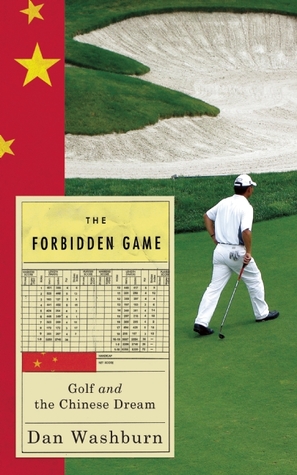Dan Washburn's Blog, page 5
December 19, 2014
Golf’s birthplace in China bans ‘virtually all golf-related activities’ for officials
Last week, The Telegraph reported on the latest crackdown on corruption and golf in China. From Tom Phillips’ story:
Since coming to power in late 2012, president Xi has launched high-profile campaigns to rein in the behaviour of wasteful and corrupt civil servants whose antics, he believes, could ultimately bring the Party down.
Those efforts have now spread to the fairways of southern China, with Guangdong’s anti-corruption agency announcing its ban on Sunday in an edict entitled: “Strictly guarding against golf club corruption”.
The prohibition was designed “to prevent unclean behaviour and disciplinary or illegal conduct,” according to a notice posted on the group’s website.
The decree means virtually all golf-related activities are now proscribed.
Officials can no longer jet off on golf-related junkets, engage in golf-related betting, play golf with people connected to their jobs, hold positions on the boards of golf clubs or societies or even acquire golf club membership.
A brief commentary on the anti-corruption agency’s website described golf as an inappropriate and potentially subversive pastime for Communist officials.
“If government workers become keen on this “noble” game, it might bring about bad consequences such as making them detached from the masses or even corrupt,” it warned.
Golf.com’s Pete Madden followed up on the story, quoting me.
Dan Washburn, managing editor of the Asia Society and the author of a new book about golf in China called “The Forbidden Game: Golf and the Chinese Dream,” said local crackdowns are not new, but what makes this one significant is its location.
“What’s interesting is that this is happening in Guangdong, the birthplace of golf in modern China and home to more golf courses than anywhere else in the country,” wrote Washburn in an email to Golf.com. “While government officials all over the nation have long known that cozying up to golf was something that was frowned upon, things have always been a little more lax the further south you got. Maybe, in China’s current political environment, that is beginning to change. Or maybe this is simply a provincial government office trying to curry favor with Beijing, and golf is an easy target.”
The new rule’s potential impact, he says, will depend on enforcement. Since the 2004 moratorium, for example, more golf courses have been constructed in China than anywhere else in the world.
“Rules can sometimes mean very little [in China],” wrote Washburn. “I think the Chinese government is very good at compartmentalizing its feelings torward golf.”
November 20, 2014
Has the big China golf course boom finally gone bust?
 It’s impossible to report on China from Brooklyn. Things change so randomly and rapidly there that you really have to be in the thick of it to try and make sense of anything (and even then you feel as though you are only scratching at the surface of the truth). So, when I left China after nine years in 2011, I for the most part gave up the China beat. I had a new full-time job, and anyway, I was living on the other side of the world. Now, it’s true that I wrote most of my China book from New York, but the bulk of the research had already been conducted and the storyline spanned (roughly) 2004 to 2010, a time period in which I called China home.
It’s impossible to report on China from Brooklyn. Things change so randomly and rapidly there that you really have to be in the thick of it to try and make sense of anything (and even then you feel as though you are only scratching at the surface of the truth). So, when I left China after nine years in 2011, I for the most part gave up the China beat. I had a new full-time job, and anyway, I was living on the other side of the world. Now, it’s true that I wrote most of my China book from New York, but the bulk of the research had already been conducted and the storyline spanned (roughly) 2004 to 2010, a time period in which I called China home.
When The Forbidden Game came out this summer and I began doing media appearances and book events, people understandably wanted to ask me about the current state of things in China. Were golf courses still banned and booming? I hadn’t set foot in China for three years, but I wanted to be able to answer these questions truthfully and intelligently, so I had tried to keep my ear to the ground. It wasn’t easy. I had a job, and book to finish, but I attempted to stay on top of things the best I could. Because of my earlier work, I was still known as “the China golf guy” — admittedly a confusing title for a non-golfer — and I was confident no other journalist would be better equipped to take on questions of this kind. Still, I can say now that in those early interviews I got some things wrong.
When people would ask me the current state of the golf course construction industry in China, I would usually say something to the effect of, Things may not be booming the way they were four or five years ago, but it’s clear China — where building golf courses has been illegal since at least 2004 — is still building more golf courses than anywhere else in the world. If people in the golf course construction industry aren’t working in China, they probably aren’t working much at all. And that was true based on the most recent information I had.
Then, in early October, a China golf industry friend sent me the following on Facebook: “Huge crackdown this year on courses. None being built and 100 being closed. Hasn’t been anything building for a while.” He said the crackdown was “linked to the overall political landscape.”
Later I heard from someone who had just returned from the annual meeting of golf course general managers in China. “The word has come down that Beijing will close 90 courses to show face about being strict on golf,” he reported. “No mention of which golf courses will be closed, but no one seems to be that concerned.”
It’s true that I heard many such rumors during my time covering the golf industry in China. Rarely did they come to fruition. Sure, there were almost constant “crackdowns” on golf course development, but they were isolated, and with varying degrees of severity. The only thing you could truly count on is that there’d be more golf courses built each year. Lots of them.
But during my recent two weeks in China, I encountered more pessimism and uncertainty from those in the industry than ever before. Everyone quoted the rumor that up to 100 courses would soon be shut down, a process that perhaps got kickstarted with the closure of a handful of courses this summer. Beijing then, as it had a handful of times over the previous decade, reiterated its oft referenced but rarely enforced ban on golf course construction. It did so again just this week. Things do appear to be ratcheting up.
What to make of it? Who knows. Maybe this is truly the end of the boom. Maybe it’s just another bump in the road. Either way, it seems a good time to share with you a recent email I received from a China golf course industry veteran. He sent it prior to my China trip, and now that I’ve returned, it really rings true. He gave me permission to publish his unvarnished views anonymously.
It is very hard for anyone to understand and properly comment on the golf industry in China or any other business there. China has always been a massive enigma and very difficult to pin down for a variety of reasons. What appears to be true today will not be true tomorrow and this is why most foreigners have difficulty there. We like to have clear rules and black and white boundaries. Asia is not put together that way and never will be.
I have been working there continually for nearly 30 years and much of it still remains a mystery to me. Most of what people continually hear in the media that is going on, especially in the foreign press, is not true, half true, and exaggerated for their ears.
From where I sit today, however, the golf industry in China is currently in a full stop mode. There are not hundreds of projects shut down and stopped, because there are not that many actual projects underway, but there are a large number of projects not moving ahead anymore or being reevaluated. There are 12 courses around Beijing which have been either closed or forced to stop operating because of lack of proper land use permits.
The current problems with golf in China right now are threefold:
1. The government is enforcing much more strictly the 2004 rules governing golf development and they now have satellite technology to monitor what is happening throughout the country.
2. Due to much more strict bank lending rules it is very difficult to borrow money for development projects, therefore more developers must use their own cash which few have access to. At the same time, the real estate industry is in a decline due to poor worldwide economic conditions and similar tougher lending regulations for real estate properties.
3. The government has finally begun to focus on their severe water shortages, especially in the north in and around Beijing, and this is a massive problem which they have no solution for currently … and golf is an easy target.
Golf in China currently has no advocate like it does in the USA and elsewhere. And golf is not the massive problem it is made out to be in much of the media in recent years — it has done a lot of good in many regions as I have witnessed. I do acknowledge however that in the last five to eight years issues relating to golf development have got completely out of hand there.
Therefore, things are not going well for golf these days in China and most developers are sitting on their hands and waiting. I do not blame them. While a few projects continue to sputter along, most will go nowhere anytime soon. I have a few things still ongoing but there is zero urgency for completion at this time. Everyone keeps talking about new policy coming down next year to clarify things, however I do not believe this will happen anytime soon because being ambiguous right now works to the central government’s advantage.
The Chinese central government is consolidating power and has bigger fish to fry than the golf and real estate development industry. Yet millions will go unemployed if this is left to flounder too long.
As for the rest of the world, there are a few projects here and there and that will remain the case for the foreseeable future, mostly user and resort-driven and some remodeling work, especially in the US, but the days of the big golf boom are over.
…
Things (in China) have been shut down since early this year. It has just taken awhile for the word to spread around. Some have tried to proceed anyhow, but with all the political power consolidation from Beijing it is now way too risky unless you are in tight with the new regime. Big time golf development is absolutely over in China for the foreseeable future.
So a few designers still have a few things going on there, but if you scratch the surface deep enough you realize they are really only treading water for things to improve. There is zero impetus to move ahead with speed, especially with a lousy real estate market most everywhere right now.
October 22, 2014
Listen: Dan Washburn’s appearance at the Chicago Council on Global Affairs
Below, listen to Dan Washburn discuss The Forbidden Game in an event hosted by the Chicago Council on Global Affairs at the Chicago Club on Sept. 26, 2014. More details at the Chicago Council website.
In four-star review, TimeOut Shanghai calls Forbidden Game ‘energetic, poignant and revealing’
Charlotte Middlehurst writes:
Energetic, poignant and revealing, Washburn’s account expertly articulates how the ‘rich man’s game’ has become an instrumental force in realising the much vaunted Chinese dream.
Read the entire review at TimeOut Shanghai.
City Weekend magazine says Forbidden Game ‘is China writing at its most thoughtful’
Tom Carter writes:
Washburn is not only a gifted writer, cleverly sketching out interconnected, character-driven portraits, but an empathetic reporter. These stories have heart, and it is clear from the first passage that the author has taken a deeply personal interest in the people he is profiling. The Forbidden Game is China writing at its most thoughtful.
Read the entire City Weekend review below (click the image for a larger version).
October 2, 2014
Golf Oklahoma calls The Forbidden Game ‘a ripping good yarn’
Tom Bedell writes:
If it sounds like a dour subject, Washburn has managed to turn it into a ripping good yarn by spotlighting three main characters: Zhou Xunshu, struggling to succeed as that rarest of entities, a Chinese tour golf professional; Martin Moore, a shaper from Florida who becomes the go-to man to construct a golf course in China, and Wang Libo, a lychee farmer on Hainan island whose life changes when golf comes to Hainan island in a big way.
The three stories are expertly intertwined.
Read the rest at Golf Oklahoma or The A Position.
September 24, 2014
Los Angeles Review of Books calls Forbidden Game ‘compelling,’ ‘fascinating’ and ‘surprising’
A lovely review from Maura Elizabeth Cunningham:
Yet as Dan Washburn writes in his compelling new book, The Forbidden Game: Golf and the Chinese Dream, golf “offers a unique window into today’s China,” a country of paradoxes perhaps best exemplified by the fact that although construction of new golf courses has been banned in China since at least 2004, more than 400 were built between 2005 and 2010, making China the only place in the world experiencing a golf boom. Government officials who enjoy hitting the links register at golf courses under false names, afraid of leaving a paper trail connecting them to a game most often associated with capitalism and corruption. And while massive golf course complexes lined with luxury villas populate large tracts of land outside Chinese cities, their owners attempt to hide the courses in plain sight, giving them convoluted names like the “Anji China Ecotourism and Fitness Center.” Like so much else in contemporary China, golf occupies a gray zone: officially forbidden, yet tolerated — even encouraged — behind the scenes, as local government officials and land developers reap massive profits from the construction of new courses.
Washburn tells this fascinating and complicated story through following three men who never meet but whose lives and fortunes are all intimately tied up in the growth of Chinese golf.
It might seem an odd choice for Washburn to focus on a game that only a handful of Chinese even play, and readers may walk away thinking that golf is more important than it truly is in China today. But Washburn uses the sport with surprising effectiveness as a lens into the country’s development over the past two decades, as Peter Hessler has done with car culture (Country Driving, 2010), and James Fallows with the airplane industry (China Airborne, 2012). Golf sheds light on China’s engagement with the outside world; on the relationship between the country’s government and its citizens; on how a variety of people — from former farmers to foreign project managers — can find opportunities in China that wouldn’t be available anywhere else. Some of that will disappear in the coming years, as the construction of new courses slows and blue-collar players like Zhou are edged out of the sport. But for a time, as Washburn shows, golf has embodied everything that makes present-day China what it is, for better and for worse: corruption and complications, yes, but also aspiration and opportunity and the chance to take a swing and drive toward one’s individual version of the Chinese Dream.
Read the entire review, entitled ‘Driving Toward the Chinese Dream,’ at the Los Angeles Review of Books.
Watch: Dan Washburn and Karl Taro Greenfeld at USC’s US-China Institute
LOS ANGELES, September 17 — Thanks to Asia Society Southern California and the U.S.-China Institute at the University of Southern California for setting up a great event. Some photos have been uploaded here.
Highlights: Dan Washburn and Sam Bidleman talk Forbidden Game at Bloomsburg Public Library
Above, please find highlight clips from my first Forbidden Game book event, held July 24, 2014, at my hometown library in Bloomsburg, Pennsylvania. Moderator for the evening was Sam Bidleman, my high school journalism teacher. It was an amazing, and meaningful, way to kick off my book “tour.”
September 16, 2014
Enter to win a signed copy of Dan Washburn’s ‘The Forbidden Game: Golf and the Chinese Dream’
Goodreads Book Giveaway

The Forbidden Game
by Dan Washburn
Giveaway ends September 23, 2014.
See the giveaway details
at Goodreads.




